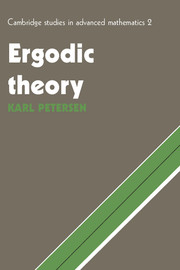Crossref Citations
This Book has been
cited by the following publications. This list is generated based on data provided by Crossref.
Berend, Daniel
1985.
Joint ergodicity and mixing.
Journal d'Analyse Mathématique,
Vol. 45,
Issue. 1,
p.
255.
Denker, Manfred
and
Keller, Gerhard
1986.
Rigorous statistical procedures for data from dynamical systems.
Journal of Statistical Physics,
Vol. 44,
Issue. 1-2,
p.
67.
Lalley, S. P.
1986.
Renewal theorem for a class of stationary sequences.
Probability Theory and Related Fields,
Vol. 72,
Issue. 2,
p.
195.
Fraser, A. M.
1986.
Dimensions and Entropies in Chaotic Systems.
Vol. 32,
Issue. ,
p.
82.
Martinez, S.
and
Tirapegui, E.
1987.
The role of stable manifolds and information in the Prigogine theory of irreversibility.
Journal of Statistical Physics,
Vol. 48,
Issue. 5-6,
p.
1283.
van Lambalgen, Michiel
1987.
Von Mises' definition of random sequences reconsidered.
The Journal of Symbolic Logic,
Vol. 52,
Issue. 3,
p.
725.
Gray, R.
1987.
Oversampled Sigma-Delta Modulation.
IEEE Transactions on Communications,
Vol. 35,
Issue. 5,
p.
481.
Angenent, S. B.
and
Fiedler, B.
1988.
The dynamics of rotating waves in scalar reaction diffusion equations.
Transactions of the American Mathematical Society,
Vol. 307,
Issue. 2,
p.
545.
Petersen, Karl
1988.
The ergodic theorem with time compression.
Journal d'Analyse Mathématique,
Vol. 51,
Issue. 1,
p.
228.
Donnay, Victor J.
1988.
Dynamical Systems.
Vol. 1342,
Issue. ,
p.
112.
Steiglitz, K.
Honig, M.L.
and
Gopinath, B.
1988.
Multi-channel signal processing for data communications in the presence of crosstalk.
p.
1858.
Gray, Robert M.
1988.
Probability, Random Processes, and Ergodic Properties.
p.
173.
Freeman, G.H.
Blake, I.F.
and
Mark, J.W.
1988.
Trellis source code design as an optimization problem.
IEEE Transactions on Information Theory,
Vol. 34,
Issue. 5,
p.
1226.
Benardete, Diego
1988.
Topological equivalence of flows on homogeneous spaces, and divergence of one-parameter subgroups of Lie groups.
Transactions of the American Mathematical Society,
Vol. 306,
Issue. 2,
p.
499.
Frank, Murray
and
Stengos, Thanasis
1988.
CHAOTIC DYNAMICS IN ECONOMIC TIME‐SERIES.
Journal of Economic Surveys,
Vol. 2,
Issue. 2,
p.
103.
Gray, Robert M.
1988.
Probability, Random Processes, and Ergodic Properties.
p.
1.
Hazewinkel, M.
1988.
Encyclopaedia of Mathematics.
p.
325.
He, N.
Buzo, A.
and
Kuhlmann, F.
1988.
Multi-loop sigma-delta quantization: spectral analysis.
p.
1870.
Mackey, Michael C.
1989.
The dynamic origin of increasing entropy.
Reviews of Modern Physics,
Vol. 61,
Issue. 4,
p.
981.
Mozes, Shahar
1989.
Tilings, substitution systems and dynamical systems generated by them.
Journal d'Analyse Mathématique,
Vol. 53,
Issue. 1,
p.
139.





